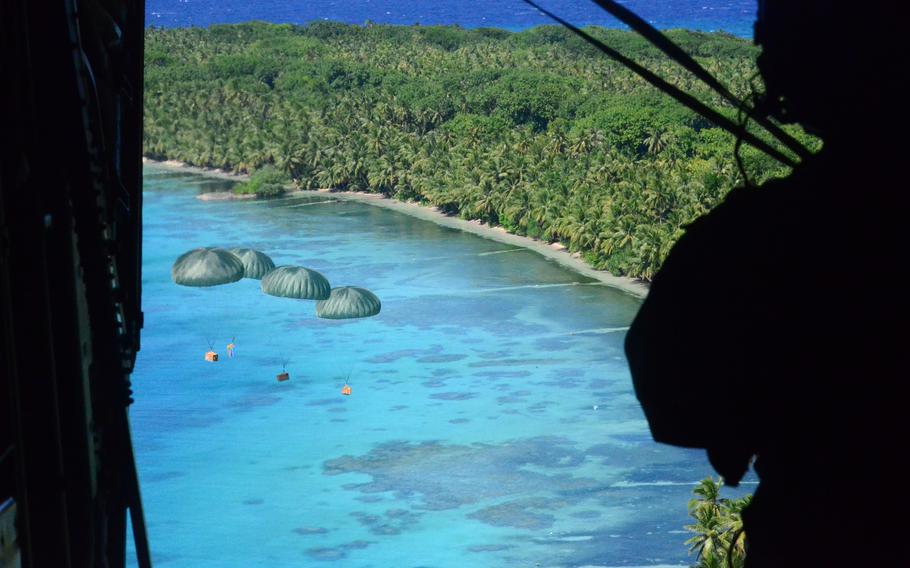
Senior Airman Juan Lucero, a loadmaster with the 36th Airlift Squadron at Yokota Air Base, Japan, watches Operation Christmas Drop bundles drift to islanders on Ifalik, part of the Federated States of Micronesia, Dec. 11, 2024. (Alex Wilson/Stars and Stripes)
EAURIPIK, Federated States of Micronesia — Inhabitants of this remote atoll rushed onto a beach Wednesday as a U.S. Air Force plane prepared to drop crates filled with much-needed supplies and some Christmas cheer.
The C-130J Super Hercules from Yokota Air Base, Japan — call sign Santa 41 — looped above the island several times before dropping four crates, decorated with drawings and holiday greetings, from an altitude of about 300 feet.
Green parachutes drifted the payload gently into the water just off the coast of Eauripik, an atoll about 475 miles south of Guam.
Santa 41, part of Yokota’s 36th Airlift Squadron, made a second drop to another island, Ifalik, shortly after. The five-hour sortie delivered eight bundles to the two atolls, both part of the Caroline chain in the Federated States of Micronesia.
After each drop, the loadmasters — Senior Airman Juan Lucero, of Wahiawa, Hawaii, and Staff Sgt. Dario Dominguez, of Ruidoso, N.M. — stood on the cargo ramp to wave at the islanders as the atolls disappeared on the horizon.
Wednesday’s sortie was just one of dozens this week, part of the Defense Department’s longest-running humanitarian-aid mission, Operation Christmas Drop.
The bundles, each decorated by donors and volunteers, carried critical supplies such as food, water, diving and fishing gear, clothing and — in the spirit of Christmas — toys.
An annual event since 1952, Operation Christmas Drop has become a means of supply the outlying islands and a way for airmen from the United States and partner nations to get real-world supply drop experience.
“It feels different from our usual work and training,” Lucero, a loadmaster with the 36th Airlift Squadron, told Stars and Stripes after Wednesday’s mission. “I get to see a result; I see the people and how much they appreciate what we do. It feels great.”
While each island favors certain landing zones for the airdrops, those spots can change from year to year, adding another level of complexity for the operation’s pilots.
Communication between the aircraft, coordinators at Andersen Air Force Base, Guam, and individual islands is critical, said Santa 41’s commander, Capt. Alex Dillenbeck.
“We have to identify where they want the bundles,” Dillenbeck, of Memphis, Tenn., said from the cockpit. “They might use anything to signal it - rafts, tarps, life vests - and they communicate with us with marine handheld radios.”
All eight of Santa 41’s bundles landed securely, he added.
For the aircraft’s co-pilot and instructor, Maj. Zeb “Spades” Kimball, the sight of the appreciative islanders is what makes Operation Christmas Drop so special.
“It’s been the same pretty much every time,” Kimball, of Colorado Springs, Colo., said of his other sorties this week. “And that definitely doesn’t get old - it kind of fills you up every single time.”
This year’s operation, which began Dec. 2 and concludes Monday, delivered 220 bundles to 60 islands in Micronesia and Palau. Also participating this year are Australia, Canada, Japan and South Korea.
The operation ultimately delivers around 82,000 pounds of supplies to over 42,000 islanders while covering approximately 1.8 million square miles of airspace, according to a Dec. 10 news release from Yokota’s 374th Airlift Wing.